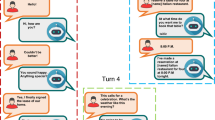Abstract
With traditional Question Answering (QA) systems having reached nearly satisfactory performance, an emerging challenge is the development of successful Interactive Question Answering (IQA) systems. Important IQA subtasks are the identification of a dialogue-dependent typology of Follow Up Questions (FU Qs), automatic detection of the identified types, and the development of different context fusion strategies for each type. In this paper, we show how a system relying on shallow cues to similarity between utterances in a narrow dialogue context and other simple information sources, embedded in a machine learning framework, can improve FU Q answering performance by implicitly detecting different FU Q types and learning different context fusion strategies to help re-ranking their candidate answers.
Access this chapter
Tax calculation will be finalised at checkout
Purchases are for personal use only
Preview
Unable to display preview. Download preview PDF.
Similar content being viewed by others
References
Yang, F., Feng, J., Di Fabbrizio, G.: A data driven approach to relevancy recognition for contextual question answering. In: Interactive Question Answering Workshop (2006)
Bertomeu, N.: A Memory and Attention-Bases Approach to Fragment Resolution and its Application in a Question Answering System. PhD thesis, Universität des Saarlandes (2007)
Van Schooten, B., Op den Akker, R., Rosset, S., Galibert, O., Max, A., Illouz, G.: Follow-up question handling in the imix and ritel systems: A comparative study. Nat. Lang. Eng. 15(1), 97–118 (2009)
Chai, J.Y., Jin, R.: Discourse structure for context question answering. In: Proceedings of the Workshop on Pragmatics of Question Answering at HLT-NAACL 2004 (2004)
Sun, M., Chai, J.: Discourse processing for context question answering based on linguistic knowledge. Know.-Based Syst. 20(6), 511–526 (2007)
Burek, G., De Roeck, A., Zdrahal, Z.: Hybrid mappings of complex questions over an integrated semantic space. In: Andersen, K.V., Debenham, J., Wagner, R. (eds.) DEXA 2005. LNCS, vol. 3588. Springer, Heidelberg (2005)
Tomás, D., Vicedo, J., Bisbal, E., Moreno, L.: Experiments with lsa for passage re-ranking in question answering. In: CLEF Proceedings (2006)
Moschitti, A., Quarteroni, S.: Kernels on linguistic structures for answer extraction. In: Proceedings of ACL 2008: HLT, Short Papers, pp. 113–116 (2008)
Kirschner, M., Bernardi, R.: An empirical view on iqa follow-up questions. In: Proc. of the 8th SIGdial Workshop on Discourse and Dialogue (2007)
Manning, C.D., Schütze, H.: Foundations of statistical natural language processing. MIT Press, Cambridge (1999)
Sahlgren, M.: The Word-Space Model. Dissertation, Stockholm University (2006)
Mihalcea, R., Corley, C., Strapparava, C.: Corpus-based and knowledge-based measures of text semantic similarity. In: Proceedings of AAAI (2006)
Fellbaum, C. (ed.): WordNet: An electronic lexical database. MIT Press, Cambrdige (1998)
Agresti, A.: Categorical data analysis. Wiley, New York (2002)
Author information
Authors and Affiliations
Editor information
Editors and Affiliations
Rights and permissions
Copyright information
© 2009 Springer-Verlag Berlin Heidelberg
About this paper
Cite this paper
Kirschner, M., Bernardi, R., Baroni, M., Dinh, L.T. (2009). Analyzing Interactive QA Dialogues Using Logistic Regression Models. In: Serra, R., Cucchiara, R. (eds) AI*IA 2009: Emergent Perspectives in Artificial Intelligence. AI*IA 2009. Lecture Notes in Computer Science(), vol 5883. Springer, Berlin, Heidelberg. https://doi.org/10.1007/978-3-642-10291-2_34
Download citation
DOI: https://doi.org/10.1007/978-3-642-10291-2_34
Publisher Name: Springer, Berlin, Heidelberg
Print ISBN: 978-3-642-10290-5
Online ISBN: 978-3-642-10291-2
eBook Packages: Computer ScienceComputer Science (R0)





